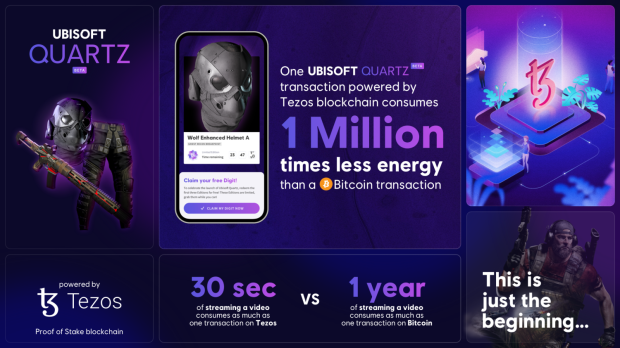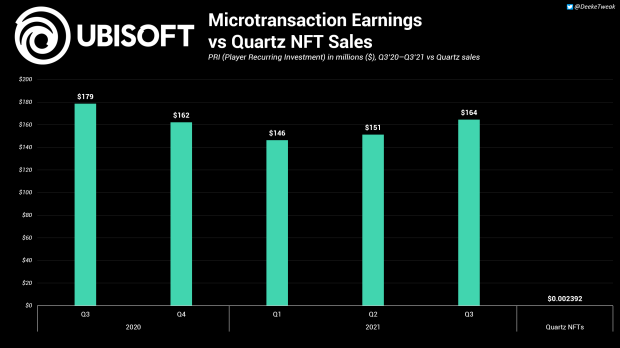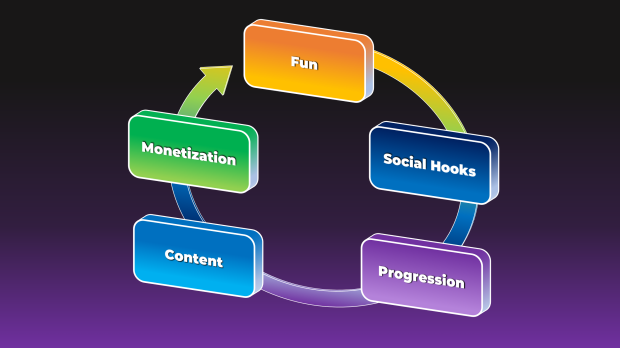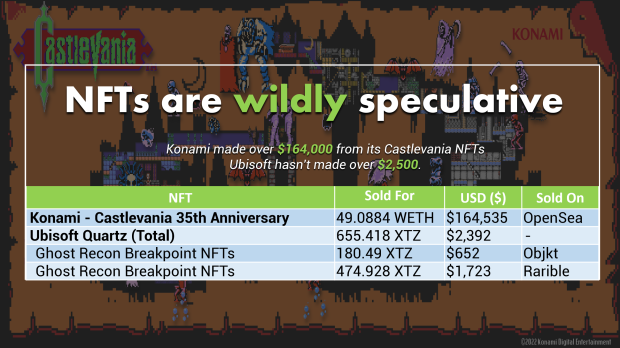Ubisoft just exposed a major flaw with gaming NFTs
Ubisoft clearly showcases just how volatile NFTs are as it effectively announces Ghost Recon Breakpoint enters maintenance mode.
Decentralized digital commodities like crypto and NFTs are quite volatile thanks to fluctuating values, shifting regulations, and security issues. Ubisoft has now effectively reminded the games industry as a whole just how unpredictable NFTs can be.

Ubisoft today announced that Ghost Recon Breakpoint is entering maintenance mode. Breakpoint will no longer get DLC or expansions and servers will remain online so the game can be played and monetized. Breakpoint was the first game to use Ubisoft's failed Quartz NFTs which are effectively in-game cosmetics that can be re-sold.
We've talked about how Ubisoft's NFTs are marginally bad for business; NFTs thrive off of scarcity and Ubisoft flooded the market, resulting in less than $3,000 in crypto resale value. That's 0.001% of Ubisoft's microtransaction earnings for Q3 2021.

Ubisoft's PRI/microtransaction earnings compared to its Quartz NFT resales.
With Quartz NFTs, Ubisoft has injected even more uncertainty into live games, a segment that's already plagued by doubts. There's never any guarantee that a game will be successful, and that goes double for a live game. Adding NFTs to the mix only complicates the structure of the game itself, which has be built around an economy to sustain the monetization method and adds further risk to a game project.
Live service titles are some of the most lucrative games on the market, but it's also an unforgiving and brutal segment that will quickly punish and squeeze out failures (like EA's Anthem). In-game NFTs only work in live games; the game itself has to be online for the NFTs to have any sort of value (for example, Ghost Recon helmets will be worthless when Breakpoint goes offline).
Once a game goes offline, gamers would effectively be trying to sell something whose value was never clearly stated to begin with in a game that is no longer playable. So the "collectible" isn't actually usable or even visible in the game.

With the exception of a few games like Destiny, World of Warcraft, Runescape, and Final Fantasy XIV, live service games typically don't remain online in perpetuity. There comes a point when a publisher shuts down a specific game--or worse, stops adding new content. The lack of content typically spells doom and gloom for a live game as the playerbase dwindles/churns to other titles, reducing monetization potential.
NFTs are an extension of a live game's typical monetization models (microtransaction, DLC, expansions, etc) and thus are dependent on the very same pillars of operation. I've talked about the Engagement Cycle in the past and noted just how important new content is to not only sustain a playerbase, but to help sustain and even boost monetization.

Here's an analysis of Quartz NFTs I wrote in a previous article:
- Business-wise, microtransactions are the opposite of NFTs. mTX needs to be widely available to everyone at all times. More access, not less, is what drives mTX revenues. Principles of wide availability, instantaneous delivery, and clearly, unrestricted purchases on a primary and trusthworthy market is what Ubisoft's entire multi-million games operation is built on.
- The entire reason to support secondary markets is to make revenue from secondary sales. If everyone is trying to sell their NFTs and no one is buying, the market simply isn't valuable. The "it's for the players" assurance is irrelevant. This isn't for the players. It's a means of finding new engagement methodologies that could in turn lead to more monetization. Creating more value for players could result in more engagement, which results in monetization. The value proposition simply isn't there, at least monetarily. And like any publicly-traded company, Ubisoft's motivations here are for the investors.
- Quartz can supercharge FOMO. Fear of Missing Out one of the most powerful forces for any live service game. If a live game has done its job right, social pressures and hooks will reinforce this trend, which sees players returning and continuing to play because they don't want to miss out on in-game rewards like daily log ins, randomized items, etc. It's a big part of online games and it's extremely persuasive.
- Ubisoft is trying to tap extrinsic, monetary rewards as a means to keep you playing over time. Don't want to miss out on that NFT drop? Play for 600 hours so you can get it and hopefully resell it for something.

Konami's NFTs are not dependent on a game and are limited. Therefore they have thrived compared to Ubisoft's Quartz NFTs.
Ubisoft's Quartz NFTs completely go against the company's current release structure of new mainline games every 3 years or so, and should not be implemented in any game that doesn't have:
- At least a 4-5 year live game content roadmap
- An expansive playerbase
- Thriving in-game economy
Quartz NFT value was never specified. The value of these items is only speculative, which is rightly so, because the sky is technically the limit and that's the major appeal of NFTs--to sell something for massive crypto value and cash out.
Ubisoft's NFTs need to be designed around a live game and can't be an afterthought. That won't work. This is clearly shown in the fact that no one is buying the Quartz NFTs, and the value of these NFTs will probably plummet as the speculative market reacts to the recent Breakpoint news.



